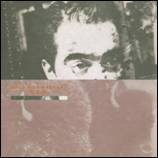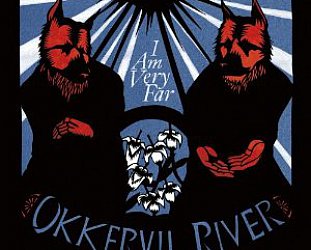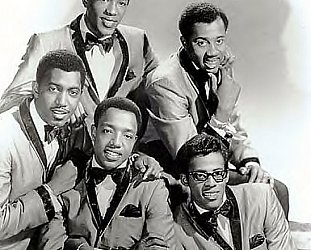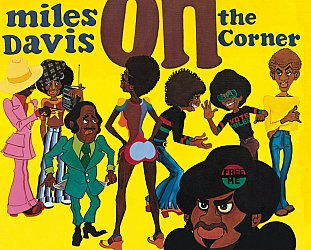Graham Reid | | 3 min read
R.E.M.: Fall On Me (Athens demo)

When R.E.M. re-signed to Warners for a reported US$80 million in 1996, it was hard to know whether to stifle the gasp or the guffaw. Although that figure bandied about was doubtless inflated and involved complex deals regarding recording, promotion and royalties, it wasn't the number that was so significant.
It was what Warners thought they might be getting.
After all, the band were then nine
albums into their career and as anyone knows, most bands have a
certain lifespan. It's a rare one which can clock up more than, let's
generously say, 10 albums without the original audience growing weary
of them. Even blockbuster touring bands like U2 (and especially the
Rolling Stones) have seen diminishing sales returns, and R.E.M. was
at about that point.
It wasn't encouraging that on the
previous tour there had been health problems within the band.
Certainly their '94 album Monster had lived up to its title,
but critics were less than universally favourable and many noted a
tailing off of ideas and innovation.
The accountants in Warners must have started chewing their pencils when the next album after the deal went down, New Adventures in Hi-Fi, didn't spring a hit single in the US – and then drummer Bill Berry quit.
Their poor selling Up
two years later marked the beginning of the slow slide from relevance
and the charts, although subsequent albums (Reveal, Around the Sun,
Accelerate and even Collapse Into Now of this year) all
had their creative peaks.
But none of them matched the albums of
their heyday when they became the band emblematic of the influence of
college radio in the mid Eighties to early Nineties. They were the alt.indie
band who were cool, not in the mainstream, lyrically enigmatic,
politically liberal in the Reagan/George H.W. Bush era – and
delivered albums that commanded stereo time for their memorable pop
smarts and barely decipherable, oblique lyrics from charismatic
frontman Michael Stipe.
The fact they were not huge sellers (Reckoning which got little airplay beyond college stations sold around 350,000 on release and arrived at the same time as Springsteen's Born in the U.S.A which went on to sell 30 million) just added to their cool-cult cachet.
They were the pop band
– yep, they wrote three minute verse-chorus guitar-jangle pop
mostly – you could like and not feel embarrassed.
The power of those early R.E.M. albums
comes back in the on-going reissue series which has so far delivered
the first three (Murmur, Reckoning and Fables of the
Reconstruction) in expanded packages which include live shows,
demos and alternate takes.
 The current re-issue is Lifes Rich
Pageant from 86 – 25 years ago! – and comes with their
urgent-sounding Athens demos (the martial beat of March Song),
rarities and a poster where Stipe looks androgynous and impossibly
young. It was the album where they became a smart, edgy, smoothly
running rock band ready for chart domination.
The current re-issue is Lifes Rich
Pageant from 86 – 25 years ago! – and comes with their
urgent-sounding Athens demos (the martial beat of March Song),
rarities and a poster where Stipe looks androgynous and impossibly
young. It was the album where they became a smart, edgy, smoothly
running rock band ready for chart domination.
It explodes with crackling rock songs (the stuttering and pointed opener Begin the Begin, the urgent These Days, Hyena, the punky Just a Touch), drops to instantly familiar pop (I Believe) and delivers their archetypal ballads (notably Fall on Me with its memorable chorus and classic 60s countermelody which could have come from a Chills' album) with style and a little swagger.
Underneath the Bunker (the
least persuasive track) had a Latin feel, the acoustic Swan Swan H
was dark and impenetrable. They were stretching.
For the most part they didn't sound
like a band running short of ideas despite constant touring and this
being their fourth album in as many years. And Stipe caught the angst
of the generation he was addressing (“let's begin again” in Begin
the Begin, “we are young, we are concerned” in These Days)
and flickered through are songs which allude to the political world
and the environment (Cuyahoga, Fall on Me).
Of course being an alt.indie band,
R.E.M. wasn't about to make things easy. The track listing on the
cover isn't the running order of the album.
Produced by Don Gehman (who had
previously given hits to John Mellencamp and challenged Stipe to be
more clear if he had anything to say), Lifes Rich Pageant drew
Rolling Stone reviewer
Antony DeCurtis to write “For R.E.M. the underground ends here.”
Not quite.
While the album had a radio-friendly sharpness and
clarity, mainstream radio once again largely ignored them. But it
couldn't for long.
Document of the following year
launched them into the mainstream with the singles The One I Love
and The End of the World As We Know It (And I Feel Fine).
No wonder Stipe felt fine, it wasn't the end of the world.
Quite the opposite. The world fell at their feet.
Accountants would follow.







post a comment